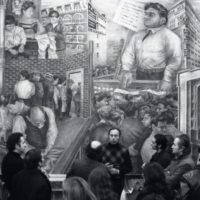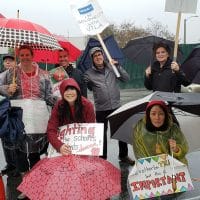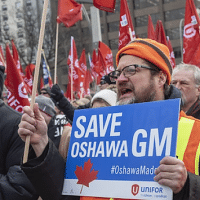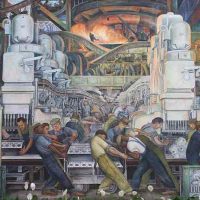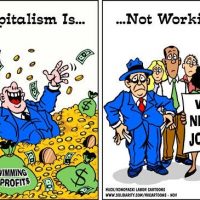-
‘A fully automated society is science fiction’—Michael D. Yates on the state of U.S. labor
Monthly Review Press editor Michael D. Yates reflects on the state of U.S. labor in this special May Day interview conducted by Farooque Chowdhury.
-
‘Facebook Coin’: The media giant is trying its hand at banking
Facebook’s cryptocurrency initiative furthers an agenda of neoliberal financialization, writes Josh Gabert-Doyon
-
Ecosocialism: For a fighting ecological trade-unionism
How can we reconcile social struggle and environmental struggle? This question poses problems for trade unionists.
-
Imagining the Green New Deal with Robert Hockett
In this episode, we speak with Robert Hockett, Edward Cornell Professor of Law at Cornell Law School. At Cornell, about his role in crafting the Green New Deal Resolution, his conception of finance as a franchise, and his experience as an advisor to Congresswoman Alexandria Ocasio-Cortez as well to Senators Sanders and Warren.
-
A new unionism for the twenty-first century
As we contemplate the ongoing decline of British trade unions, and as Americans consider their next move after the Supreme Court’s Janus vs AFSME decision, the the Independent Workers of Great Britain (IWGB) and United Voices of the World (UVW) point towards an alternative way of organising, fighting—and winning.
-
Marx and the democratization of work
The solution for capitalism’s problems requires transforming the capitalist workplace into democratic institutions where everyone has an equal say on what happens there.
-
Marx imagined a totally asexual worker
Silvia Federici is one of the most important feminist thinkers of our time–anyone looking for profound analyses of the role of housework, violence against women, or the importance of control over the body in capitalism inevitably encounters her writings.
-
Direct Job Creation in America with Steven Attewell
In this episode, we’re joined by Steven Attewell, Adjunct Professor of Public Policy at the City University of New York’s School of Labor and Urban Studies.
-
A new day for Mexican workers
NAFTA had been in effect for just a few months when Ruben Ruiz got a job at the Itapsa factory in Mexico City in the summer of 1994.
-
The rise of the student worker
The student population today is unrecognisable from that of a generation or more ago, writes Matt Myers. And it is central to any socialist project for the future.
-
Caring enough to strike: U.S. teachers’ strikes in perspective
When it comes to the work of social reproduction of another human being, the care of another human cannot be limited by capital’s ticking clock, so these workers put in their own time, or in the case of teachers, also their own money, to provide the best care they can.
-
General Motors’ factories should not be closed
It’s become something of a shopworn cliché to say that “for every problem, there’s an opportunity.” However, I submit that this adage might well apply to General Motors’ November 26th announcement that it will be eliminating more than 14,000 jobs and closing seven factories worldwide by the end of next year, including four factories in the U.S. and one in Canada.
-
Three years after being passed, Venezuela’s Seed Law is being implemented from below
Venezuelan grassroots organization Venezuela Libre de Transgenicos / Semillas del Pueblo (Venezuela Free from GMO / Seeds of the People) reports on the third anniversary of the passing of the Seed Law and the efforts driven from below to implement it.
-
The political roots of falling wage growth
It’s now official: workers around the world are falling behind. The International Labor Organization’s (ILO) latest Global Wage Report finds that, excluding China, real (inflation-adjusted) wages grew at an annual rate of just 1.1% in 2017, down from 1.8% in 2016. That is the slowest pace since 2008.
-
Exploitation, Marxism, and Labour Law (Part Two)
The first model is a radical critique of all forms of bourgeois right, including employment rights, which are considered to constitute an ideological reflection of the capitalist mode of production, and therefore an inseparable companion of exploitation.
-
Scope and militancy of teachers’ strike shakes the ruling class
Lithuania is being shaken by an unprecedented teachers strike, which has now entered its fourth week and is causing severe anxiety, distress and panic among the ruling class and its political representatives. Already, Prime Minister Saulius Skvernelis has been forced to sack not only the hated Education Minister, Petrauskienė, but also two other Ministers: for Culture, and the Environment.
-
Exploitation, Marxism, and Labour Law (Part One)
On trial with other members of the Rhenish District Committee of Democrats in 1849, Karl Marx argued in a Cologne court that their prosecution was based upon “laws which the Crown itself has trampled into the dirt”.
-
Every woman is a working woman
In 1972 feminists from Italy, England, and the United States convened in Padova, Italy, for a two-day conference. Associated with the extra-parliamentary left, anti-colonial struggles, and alternatives to the communist party, these activists composed a declaration for action, the “Statement of the International Feminist Collective.”
-
The language of capitalism isn’t just annoying, it’s dangerous
A new book argues that words like “innovation” are doing more than telling you who to avoid at parties.
-
Contemporary capitalism and the world of work
The most significant feature of contemporary capitalism which is of relevance to the world of work is its inability to provide work to a substantial proportion of persons looking for it.








